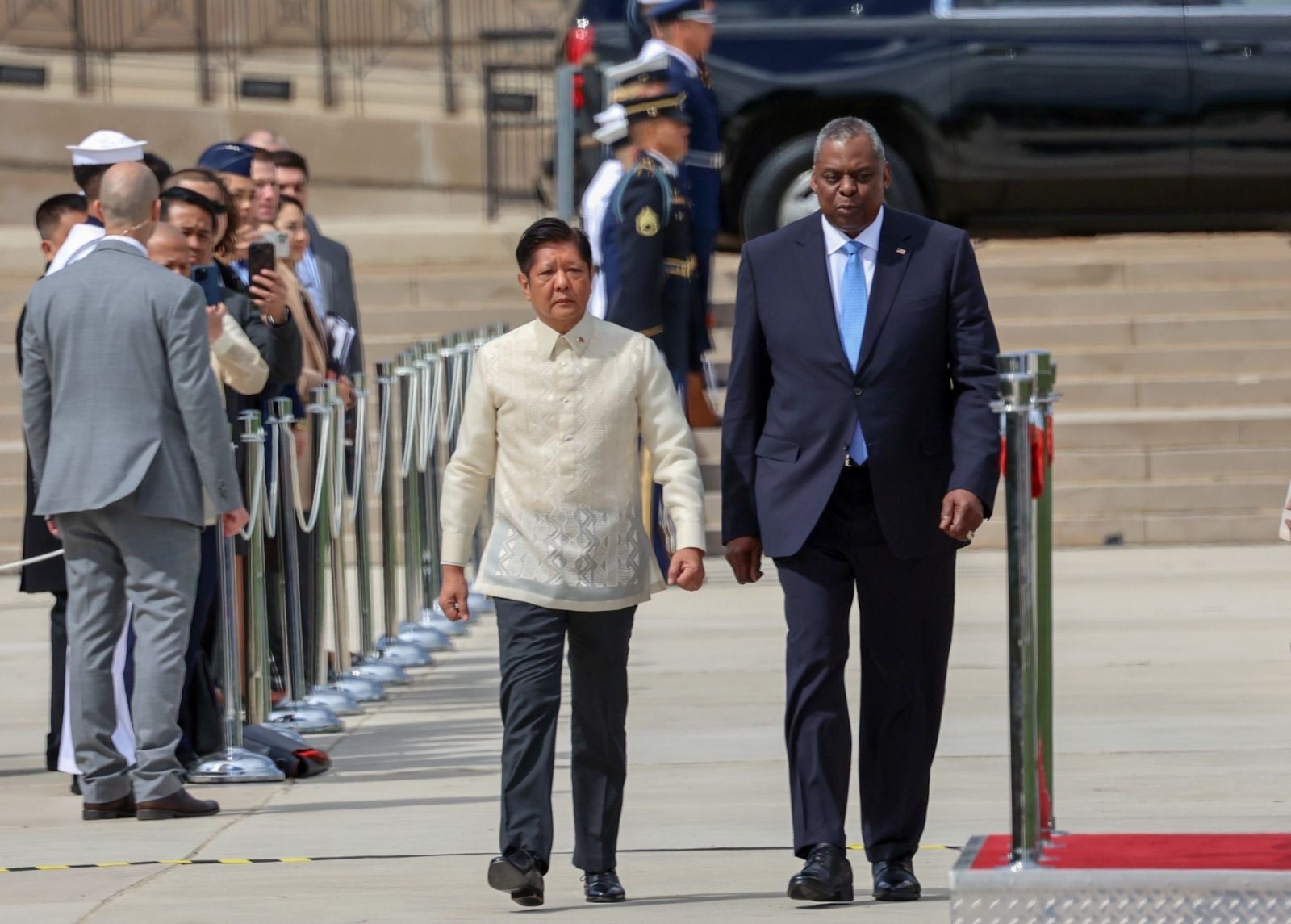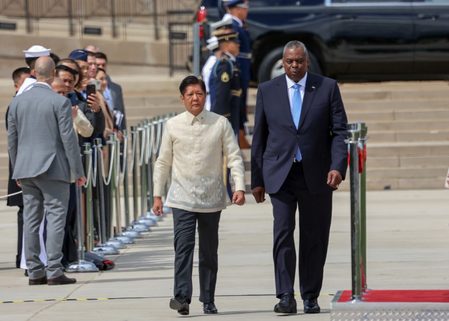From Rappler (May 5, 2023): ‘Meddling’ in the South China Sea? China didn’t allude to us, says Marcos (By BEA CUPIN)

In a press briefing wrapping up his official visit to the US, the Philippine president says his strategy to keep good ties with China is no different from his plan to keep good relations with the US
WASHINGTON DC, USA – President Ferdinand Marcos Jr. downplayed Beijing’s reaction to recently released bilateral security guidelines between Washington and Manila by telling media that Beijing was chastising the US and not the Philippines.
“Well, I do not think… as representing…as a Filipino and representing the Philippines, I don’t feel alluded to. How can anyone say that we are not party and interest in all of these issues?” said Marcos on Thursday, May 4 in a media forum to wrap up his five-day official working visit to the US.
On May 3, following a meeting between Marcos and US Defense Secretary Lloyd Austin at the Pentagon, the US released bilateral defense guidelines that build on the 71-year-old Mutual Defense Treaty between Manila and its former colonizer.
READ: US issues guidelines on defending Philippines from South China Sea attack

In response, China Foreign Ministry Spokesperson Mao Ning said “China firmly opposes any country’s move to meddle in the South China Sea issue to harm China’s territorial sovereignty and maritime rights and interests by citing the guidelines.”
Other Stories
US issues guidelines on defending Philippines from South China Sea attack
The guidelines are a first since the Mutual Defense Treaty was signed in 1951 and follows scores of Philippine diplomatic protests in the past year over what it calls China's 'aggressive' actions and threats against its coast guard
US defense chief promises Marcos: ‘We will always have your back in the South China Sea’
During a Pentagon meeting, President Marcos and US Defense Secretary Lloyd Austin commit to an ‘increased tempo’ of joint patrols to ‘support the Philippines’ lawful exercise of its rights in the South China Sea'
The guidelines cover a wide range – from a commitment to sharing real-time information on the South China Sea, joint patrols, and helping upgrade Philippine maritime assets. Given Manila’s proximity to Taiwan and the South China Sea, experts see it as a guide for the US to help the Philippines in defending itself from China.
The document itself makes no mention of China or the People’s Republic of China but mentions the South China Sea several times, which Beijing has practically claimed in its entirety.
“I would like to stress that the South China Sea is the shared home for countries in the region, not a hunting ground for forces outside the region. When regional countries are committed to mutual trust, solidarity, cooperation and properly handling differences, they have in their hand the key to peace and stability in the South China Sea,” said Mao in a May 4 press conference.
Asked to react to Mao’s statements, Marcos said it was only “right and proper” for the Philippines to find ways to “strengthen our capabilities” and to “find and forge partnerships” both with the US government and the American private sector.
“We in the Philippines need to do this if we are going to go forward and find new opportunities for our people at hindi naman masasabi na walang karapatan ang Pilipinas na gawin lahat ‘yun (it cannot be said that the Philippines has no right to do all these). Kaya’t ‘yang statement na ‘yan ay sa palagay ko ay hindi naka-direct sa Pilipinas (So that statement isn’t directed towards the Philippines),” Marcos added.
The Philippines is one of several countries that finds itself in the middle of the growing competition between Washington and Beijing. Even as Marcos has stepped up ties with the US, he’s also kept China close and even promised a “new golden age” in relations with Beijing.
His strategy to keep good ties with China, said Marcos, is no different from his plan to keep good ties with the US. “Our foreign policy is almost simplistic when I describe it because our foreign policy is based on the pursuit of peace, our foreign policy is based on the promotion of our national interest,” he said.
Yet dynamics between Manila and Washington are far from comparable to ties with Beijing. Despite the promised “new golden age,” Chinese aggressions have only intensified in the South China Sea.
The Philippine Coast Guard has been especially active in reporting these incursions – most notably, a laser-pointing incident and most recently, a near-collision in those volatile waters.
The Asian neighbors had promised communication mechanisms to ease tensions in the South China Sea, but Marcos recently said China has yet to submit the names of its representatives. Still, said the Philippine president, “disengagement is not an option,” he said in a forum hosted by a Washington-based think tank. – Rappler.com

In response, China Foreign Ministry Spokesperson Mao Ning said “China firmly opposes any country’s move to meddle in the South China Sea issue to harm China’s territorial sovereignty and maritime rights and interests by citing the guidelines.”
Other Stories
US issues guidelines on defending Philippines from South China Sea attack
The guidelines are a first since the Mutual Defense Treaty was signed in 1951 and follows scores of Philippine diplomatic protests in the past year over what it calls China's 'aggressive' actions and threats against its coast guard
US defense chief promises Marcos: ‘We will always have your back in the South China Sea’
During a Pentagon meeting, President Marcos and US Defense Secretary Lloyd Austin commit to an ‘increased tempo’ of joint patrols to ‘support the Philippines’ lawful exercise of its rights in the South China Sea'
The guidelines cover a wide range – from a commitment to sharing real-time information on the South China Sea, joint patrols, and helping upgrade Philippine maritime assets. Given Manila’s proximity to Taiwan and the South China Sea, experts see it as a guide for the US to help the Philippines in defending itself from China.
The document itself makes no mention of China or the People’s Republic of China but mentions the South China Sea several times, which Beijing has practically claimed in its entirety.
“I would like to stress that the South China Sea is the shared home for countries in the region, not a hunting ground for forces outside the region. When regional countries are committed to mutual trust, solidarity, cooperation and properly handling differences, they have in their hand the key to peace and stability in the South China Sea,” said Mao in a May 4 press conference.
Asked to react to Mao’s statements, Marcos said it was only “right and proper” for the Philippines to find ways to “strengthen our capabilities” and to “find and forge partnerships” both with the US government and the American private sector.
“We in the Philippines need to do this if we are going to go forward and find new opportunities for our people at hindi naman masasabi na walang karapatan ang Pilipinas na gawin lahat ‘yun (it cannot be said that the Philippines has no right to do all these). Kaya’t ‘yang statement na ‘yan ay sa palagay ko ay hindi naka-direct sa Pilipinas (So that statement isn’t directed towards the Philippines),” Marcos added.
The Philippines is one of several countries that finds itself in the middle of the growing competition between Washington and Beijing. Even as Marcos has stepped up ties with the US, he’s also kept China close and even promised a “new golden age” in relations with Beijing.
His strategy to keep good ties with China, said Marcos, is no different from his plan to keep good ties with the US. “Our foreign policy is almost simplistic when I describe it because our foreign policy is based on the pursuit of peace, our foreign policy is based on the promotion of our national interest,” he said.
Yet dynamics between Manila and Washington are far from comparable to ties with Beijing. Despite the promised “new golden age,” Chinese aggressions have only intensified in the South China Sea.
The Philippine Coast Guard has been especially active in reporting these incursions – most notably, a laser-pointing incident and most recently, a near-collision in those volatile waters.
The Asian neighbors had promised communication mechanisms to ease tensions in the South China Sea, but Marcos recently said China has yet to submit the names of its representatives. Still, said the Philippine president, “disengagement is not an option,” he said in a forum hosted by a Washington-based think tank. – Rappler.com
https://www.rappler.com/nation/marcos-jr-response-china-reaction-philippines-united-states-bilateral-defense-guidelines/


No comments:
Post a Comment
Note: Only a member of this blog may post a comment.